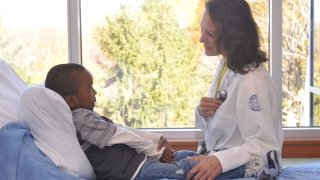Medicaid and Our Children
- Larry Levine, President & CEO

Contrary to popular perception, many are in working families with low incomes. Others are primarily covered by primary insurance, but have serious chronic conditions that require ongoing therapies and specialized care that are not covered by private insurance. Reductions in their Medicaid coverage would be catastrophic: sick children would be turned away, denied the primary and specialty care they desperately need.
Kids are by far the lowest spend of any group of Medicaid recipients. They account for 43% of enrollees, but only 20% of the costs. To translate this into dollars: in 2016, the federal spend per child was $1,900. It was more than $4,000 for adults and nearly $8,000 for the elderly, according to the Congressional Budget Office. And the medically fragile kids Blythedale and the 18 other children’s specialty hospitals in the U.S. treat make up only 1% of the children served. Yet the proposed federal cuts are across the board, cutting a huge swath: the elderly, adults and kids.
How does the new Congress propose to do this? Medicaid is currently funded by a combination of federal and state money. The new Congress seeks to drastically cut federal funding, substituting block grants to the states or federal caps for each patient. Paraded as giving the states more flexibility, these actually just give them much less federal money. And with less money for health care, the states will be forced to cut enrollments, payment and benefits.
How will this impact kids? This is not just a matter of graphs, balance sheets or pie charts.
It means denying care to the child with asthma; the child with cancer; the two-pound premature baby dependent on a respirator to breathe.
No matter what your view on the role of government, I think we can all agree that it is government’s responsibility to protect the most vulnerable: sick and disabled children.
They cannot advocate for themselves, but we owe them the promise of a better life through our investment in their health, one of the best investments we can make as a nation. We owe them the opportunity and the means to become productive members of society, who can contribute to our country and its economy. We owe sick and disabled children the chance to have their lives transformed, and to be treated, each and every one of them, as if they were our children.
Because they are.



